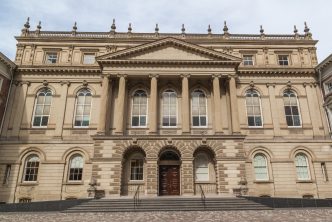This article was originally published on GuelphWire.
You can now take a tour of your next home in full virtual reality.
In an uncertain time, the real estate industry has been able to respond with innovation in an effort to keep the market steady.
With the declaration of a pandemic, and physical distancing protocols in place, many workplaces that focus on in-person interaction needed to find a way to operate in the online world.
“When Real Estate was deemed an essential service, open houses were cancelled, and face to face interactions were heavily restricted,” said Anita Van Rootselaar, a realtor with RE/MAX.
The reduction of in-person viewings presented a new challenge to the real estate world, and agents were able to respond with a repertoire of new tools.
“I’m immersed in learning new technology in regards to online meetings, virtual marketing, 360Tours, social media postings etc…,” said Van Rootselaar.
“Viewing activity has been greatly reduced,” said Van Rootselaar. “Some properties only allow virtual visits until an offer is in place. I work as thoroughly as possible to provide visuals and information about the property for buyers so that they are well vetted before viewing a property.”
“Some of the new viewing options offer 3D tours and screen shares with 3D cameras. Creating an interactive house showing,” said Brad Wylde, a real estate agent at RE/MAX.
Wylde says this technology has existed for a while, but “we’re using it a lot more now that everyone is at home”.
“The technology we’ve got is good for virtual selling,” said Wylde. “You can walk through the house as if you were doing it in person […] you can even do it with VR goggles if you wanted to.”
Even with the new technology, “There are still physical showings going on,” said Irene Szabo, a realtor with Home Group Realty.
Szabo says the real estate industry is abiding by strict guidelines to keep people safe. Agents are providing latex gloves, and disinfectant, and are the only people to touch cupboards and doors. She is recommending prospective buyers keep their hands in their pockets if they do go to a house showing.
Businesses like RE/MAX have created house-showing kits. People can take out the personal protective equipment left on the porch and dispose of it as they leave.
As life moved online, prospective buyers and sellers hunkered down, causing a drop in the market compared to previous years.
“The amount of usual March/April activity has declined by over 75%,” says Van Rootselaar.

Szboda agrees that it has been a bit slower since the lockdown started, but that buyers and sellers still exist. “[people] have been laid off, and that affects mortgage applications,”
“Once the province begins to open up and people feel a little more comfortable about going out … you’re going to see a large influx of inventory come to market.” Says Wylde, noting that activity in the market is beginning to pick up.
“Many predict a strong summer selling season since the spring market has been delayed.” Van Rootselaar.
“It’s a stable market,” Szboda said. “No one who has recently bought a house should worry about the price of their house dropping.”
It seems clear that, while the pandemic has changed some things for the time being, much of the real estate industry has been able to act reflexively and respond with solutions.
“It could be a long time before you see an open house,” said Szabo.
Wylde says any impact to the market probably will not be felt until the third or fourth quarter of the year.
“It’ll be really dependent on what happens with the economy for the next six months or so,” said Wylde.
There is room for a cautious optimism as the economy begins reopening this month.
“There is no concern about prices dropping, many say that prices will be even be up slightly this year,” said Van Rootselaar.
For people still looking to enter the market, Szabo recommends that people keep trying, “be patient, be careful, but don’t be scared.”






